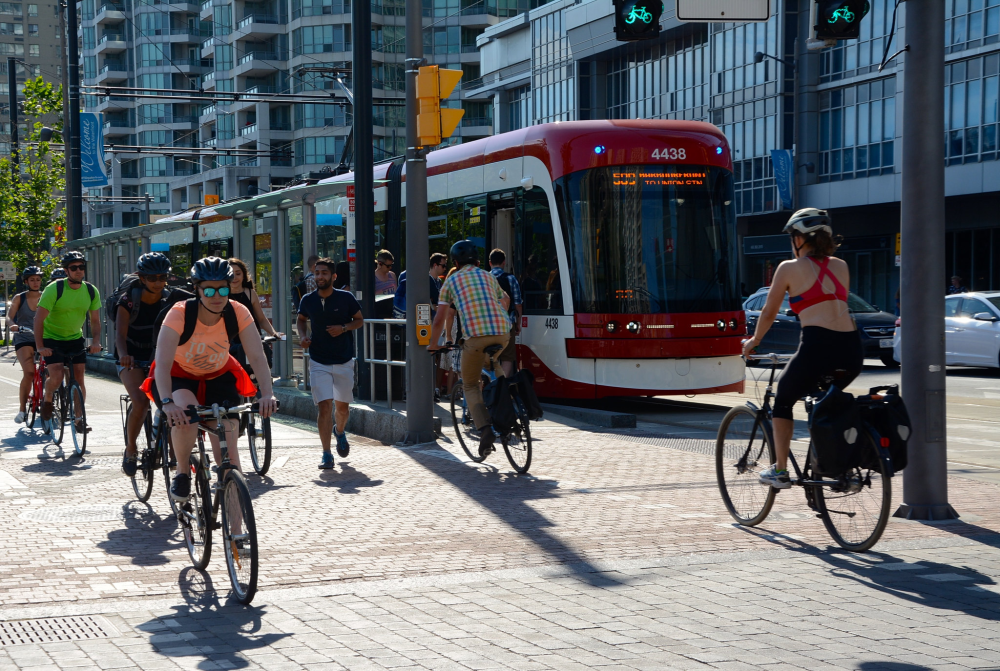Climate change isn’t just a hypothetical idea anymore that will impact our great-grandkids — the effects are a reality that are facing millions of Canadians every day. Through increasing temperatures, more extreme weather, and rising sea levels, climate change is impacting our mental and physical health. The 2018 International Lancet Countdown Report, which monitors the relationship between health and climate change, found that in Canada, extreme heat claimed at least 90 lives in summer of 2018, and chronic exposure to fine particulate matter from human activity resulted in 7142 premature deaths in 2015. These numbers underscore the urgency to tackle climate change for the good of our health.
The good news is that the same solutions that will reduce greenhouse emissions will also deliver health benefits, and create healthier, more livable cities and communities. Even more encouragingly, they are already being implemented across the country. Here are just a few examples of the kind of credible action we need to dial up to improve and protect Canadians’ health.
Clean electricity = healthier Canadians
Creating a clean electricity grid — that is, one that phases out coal-fired power and introduces renewable electricity — is critical to decarbonizing our economy. It also brings massive health benefits to all Canadians. Due to wind patterns, health impacts from coal are found in almost all provinces, even the non-coal burning jurisdictions. Pollutants from coal are found to contribute to heart and lung diseases, aggravate asthma, and increase premature deaths and hospital visits. Canada’s decision to phase out electricity production from coal-fired power by 2030 will avoid 1,008 additional premature deaths, 128,800 asthma episodes and $5 billion in health system costs. The coal phase-out offers Canadians a once in a generation opportunity to make sure the polluting electricity taken off line is replaced by energy that is free of greenhouse gas emissions and air pollutants.
Faster, more pleasant commutes = cleaner air
The transportation sector contributes nearly a quarter of Canada’s greenhouse gas emissions and is a leading cause of air pollution. To really tackle climate and health challenges, we need to tackle our dependence on cars, and use more efficient fuels when we do need to drive.
While not yet finalized, Canada has introduced a clean fuel standard that will lower the emissions intensity mix in fuels for passenger and freight vehicles. Measures like this, and offering incentives to increase the number of electric cars and buses on the roads while reducing emissions from heavy duty trucks, are essential to meet and exceed Canada’s emissions reduction target under the Paris Agreement. Not only will strong action like this reduce harmful emissions, but it will also reduce the toxic substances like nitrogen oxides and carbon monoxide that we breathe in when cars and trucks burn gas and diesel. Think about it: if you have to be stuck in traffic anyways, wouldn’t you rather be behind an electric 18-wheeler and not thinking about the fumes you’re breathing in?
Alongside action to reduce pollution on our highways, to truly create a low-carbon future, we need to rethink how we live, work, and play in our cities and communities. This means making decisions about the location and design of our neighbourhoods that are compatible with reduced car use. By creating these spaces in close proximity to public transit infrastructure (and vice versa, planning transit by existing communities), cities can increase transit use, walking and cycling, and reduce traffic congestion. Transit-oriented development generates a host of health benefits that deliver more livable cities, including through reduced air pollution and increased levels of physical activity. The option to cycle to a commuter train, then walk to your office should be an easy choice that any urban-dwelling Canadian can make.
Better-planned transportation systems also decrease traffic and air pollution while increasing street safety. As our cities (and online shopping habits) continue to grow, we need to integrate transit and cycling plans around goods movement in our cities. Canadians need to see strategies that envision space for people, not just cars.
Energy efficient buildings = cozier and more cost-efficient homes
The building sector is the third biggest contributor to greenhouse gas emissions in Canada. Making our homes and buildings ultra-energy efficient and low carbon is one of the keys to climate action and protecting our health. At a time when land values are skyrocketing andhomelessness is on the rise, existing buildings provide space for a range of housing costs and options that we can’t afford to lose. Modernizing our existing buildings will provide high-quality, safe, and healthy housing for the next generation. High-performance buildings are easier to heat and cool, are less drafty, better ventilated, and less costly to run. Canadians spend 90 per cent of our lives indoors — ensuring a healthy level of indoor air quality, free of mould and pollution, requires us to be more deliberate about how we move air and moisture in and out of our work and living spaces.
When government and individuals make choices that move us closer to the low-carbon future we need, we can keep or even improve our quality of life. Let’s all get behind climate action that improves our mental and physical health, and makes our cities and communities more livable.
Check out the other blogs in this series:
This election, let’s plan for a climate future we can all get behind








